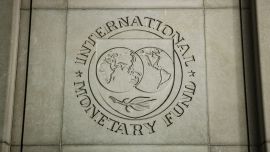President Javier Milei’s economic reform package won a key victory when the Senate approved his 'omnibus' reform bill Thursday but additional income tax legislation was rejected following debate marred by violent protests that broke out earlier in front of Congress.
After weeks of tense negotiations, senators passed Milei’s market-friendly plan that included privatisations and labour law changes when his vice-president broke a 36-36 tie. Hours later, the income tax portion of a second bill failed in a vote that went section-by-section through the proposal.
Both the income tax proposal — which Milei’s supporters made changes to late on Wednesday to help smoothe passage — and the omnibus economic bill still need to go back to the lower house.
Underscoring some of the political resistance to Milei’s proposals, protesters threw rocks, broken glass and Molotov cocktails Wednesday afternoon at riot police attempting to clear a nearby plaza with a water cannon and tear gas. Protesters also flipped and burned a car.
Despite the income tax setback, the economic changes approved in the first bill would mark Milei’s his biggest legislative achievement, one investors are likely to cheer. While the legislation has gone through significant revisions, it contains measures designed to make the country more attractive to employers and business interests. And its advancement proves Milei can legislate despite a hostile relationship with members of Congress he continues to vilify.
“The Milei administration thus secured its first legislative victory, despite its limited representation in Congress,” said Diego Pereira, an economist at JPMorgan.
Investors appeared to respond well to the vote. Sovereign dollar bonds due in 2035 edged higher in early Thursday trading, rising as much as 0.6 cents to some 42.6 cents on the dollar, according to pricing data compiled by Bloomberg.
“This is a positive development for investors, who are still on a wait-and-see mode with Argentina,” Marcelo García, Latin America director at political risk consultancy Horizon Engage, said by email. “The tight outcome of this vote in the Senate means the Milei government will need to continue to grow its incipient negotiations skills.”
Outside the debate on Wednesday, dozens of people were detained and at least nine were hospitalised, including multiple members of the lower house of Congress, according to local media. Pot-banging demonstrations were heard throughout the capital as darkness fell.
Milei’s party modified the economic reform bill earlier on Wednesday to heighten its chances by removing the state-run airline company Aerolíneas Argentinas, among others, from the list of firms eligible for privatisation. The controversial bid previously put at risk his entire privatisation chapter, which also includes energy and freight firms. That means even the approved legislation returns to the lower house.
“The final technical stage could still bring surprises,” said Mariano Machado, principal Americas analyst at risk intelligence company Verisk Maplecroft.
Milei’s party holds just 7 of 72 seats in the upper chamber. Meanwhile, the Peronists have 33 senators.
The Senate vote helps to validate Milei’s decision to tap Guillermo Francos, a career politician, as his new Cabinet chief to negotiate votes and concessions in the final days leading up to the vote. The president’s dismissal of Nicolás Posse as Cabinet chief marked the highest-level departure from the government since Milei took office December 10.
In a show of thawing tensions, the government handed hundreds of previously halted public works projects over to the provinces so they could restart them, although funding assurances are less clear.
On Tuesday evening, a document circulated among journalists announcing that a senator from a moderate bloc, Juntos por el Cambio, had been named ambassador to UNESCO in Paris, prompting accusations of horse trading.
The reintroduction of income taxes, part of the separate fiscal bill, was always controversial. In a statement late Wednesday, Milei celebrated the first bill’s initial approval.
“It’s a triumph for the Argentine people and a first step toward the recovery toward our grandness, having approved the most ambitious legislative reform in the past 40 years,” Milei’s office said.
The Presidency didn’t immediately issue a response to the income tax legislation’s defeat.
Milei left Argentina on another international tour Wednesday night to join Group of Seven leaders in Italy this week, a trip he initially cancelled and later reconfirmed. He’ll return to home next week before flying out again to receive awards from libertarian organisations in Spain and Germany.
related news
by Manuela Tobias, Bloomberg

























Comments